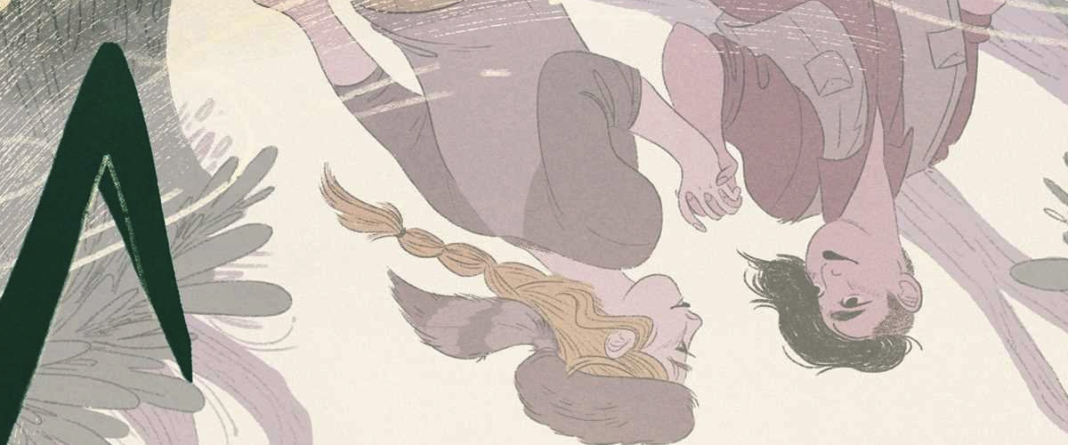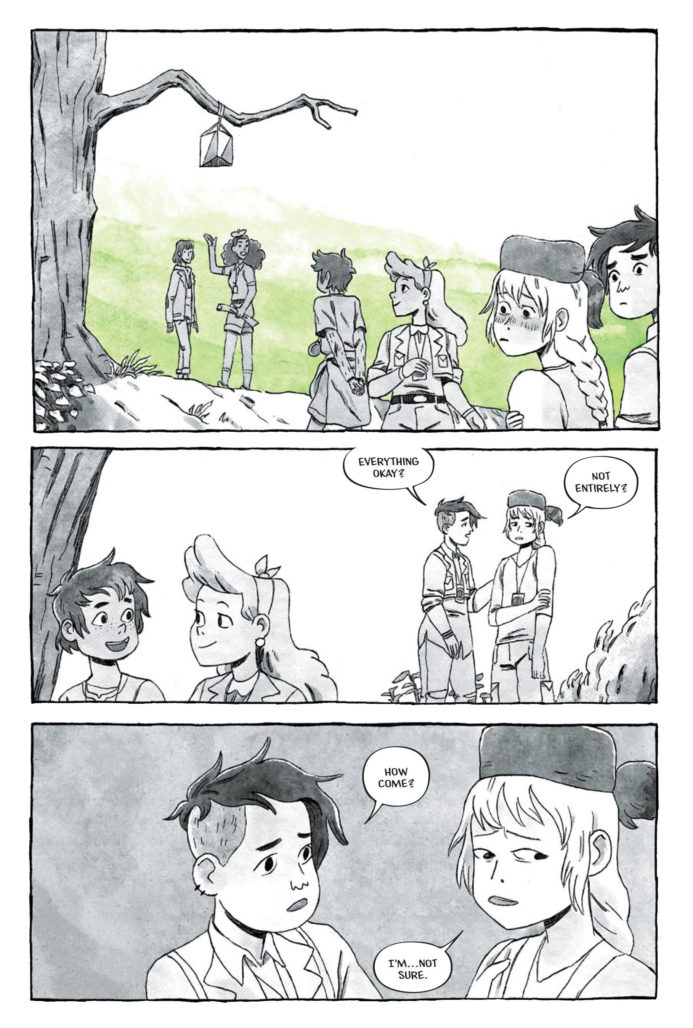Welcome to Queerness In Comics, a bi-weekly column by Avery Kaplan, which will explore queer representation in comics. This week, Avery is exploring Lumberjanes: The Infernal Compass, the graphic novel released in 2018.

Artist: polterink
Letterer: Jim Campbell
Publisher: Boom! Box
In the graphic novel Lumberjanes: The Infernal Compass by Lilah Sturges and polterink, the Lumberjanes face the consequences of a mystical navigational instrument that has the power to lead people astray. However, while the directional signifier displayed by the Infernal Compass may not necessarily align with the actual signified direction, the conclusion of the story presents a more nuanced understanding of the mystical artifact.
Orienteering
A central element of the premise of The Infernal Compass is the orienteering. As explained by Jen, the competitive sport involves making one’s way across a designated course using only a compass and a topographical map. Along the way, participants locate a series of “control points” (signified by white and orange flags) by using the compass and map to chart their course from control point to the next.
Naturally, the introduction of the Infernal Compass complicates the prospect of orienteering. After all, how can one successfully navigate their way from one control point to the next when the signifier displayed by the compass doesn’t match up with the direction one is meant to be heading?
The Name of the Ship
During the scene in which Jen explains orienteering, April notices that Mal and Molly are holding hands and is unable to contain her excitement. April is so invested in the budding romance that she has even spent time considering prospective names for their ship – explaining to Ripley that all famous couples have cutesy portmanteau designations for their relationships.
The proceedings cause Mal to blush, but eventually, she admits that she’s given the ship name some consideration herself. However, Molly can’t help but feel weird about the spotlight being shined on her and Mal.
It’s Not Easy Being Green
One of the most striking and immediate visual distinctions between The Infernal Compass and the ongoing Lumberjanes comic is the use of color. While the ongoing comic features a full spectrum of bright color, the majority of the graphic novel is black and white, with green spot coloring featured throughout.
The appearance of green in The Infernal Compass is not random. The color is most obviously connected to the Infernal Compass itself: when Ripley first notices the compass needle spinning and calls attention to it, the compass face is entirely green. Likewise, when the magic of the Infernal Compass activates and separates one of the friends from the group, the sky acquires a green tint.
However, the appearance of the color green is not solely limited to the compass itself. The eyes of the automated butlers that were built by the “antagonist” gleam green as well, and the color seems to spread throughout the panels when these mechanical manservants undertake their morally questionable machinations. Furthermore, the background is colored green at certain key narrative moments, as when Molly voices her fear that her relationship with Mal could lead to a rift that not only separates the two of them but also drives their friends as at the camp away.
Dame Henrietta Boniface Nibley and the Infernal Compass
The titular compass may be dangerous to the uninitiated, and in part, that leads to Mal declaring that the mystical relic should be destroyed. However, the “antagonist,” Dame Henrietta Boniface Nibley, has a different perspective on the artifact.
When Molly first encounters Dame Nibley, it seems as though she had befallen the same fate to which Molly fears she will be subjected. Nibley explains that she used to be a member of Her Majesty’s Club for Lady Explorers, Adventurers, and Other Die-Hard Womanly Sorts. But while Nibley’s highest aspiration had been to be an explorer, she proved unskilled and instead spent most of her time building her automatons.
Fearing that she’ll be ejected from the club, Nibley launches an expedition to locate the lost relic known as the Infernal Compass – only to see her fellow lady explores vanish over the course of the journey. Her story represents the manifestation of Molly’s worst fears, and Nibley drives the point home by declaring that she is better off without friends, anyhow.
Ché la diritta via era smarrita
On the back of the Infernal Compass, a quote from the opening lines of Dante’s Inferno is inscribed: “ché la diritta via era smarrita,” or translated to English, “for I had lost the path that does not stray.” While Ripley, Mal, and Molly are puzzled over the meaning (given that they don’t understand Italian), a person with the context for the statement could reason that the direction indicated by the compass may not necessarily be the direction the holder wishes to travel.
While Nibley’s lack of faith in friendship led her to tie up the Lumberjanes and leave them under the guard of her automated butlers, Molly’s loyalty to her friends – even in the face of doubt – shows her the error of her ways. But when the idea of destroying the compass is brought up again, Nibley points out that it’s unnecessary: even though the Infernal Compass may point in the wrong direction, having a deeper understanding of both oneself and how the compass works ultimately renders the misdirection harmless.
For Molly, this means the reaffirmation of her place within the Lumberjanes, even as she embraces the blossoming romance between herself and Mal. But The Infernal Compass doesn’t offer a blanket solution for everyone: Nibley is not reunited with the other members of the explorers’ club from which she parted ways in the past.
Instead, Nibley’s direction leads elsewhere – as she discovers that even if she had been led astray, the friends she made along the way are literally the friends she made along the way, as by her own admission, the absence of human companionship provided her with the opportunity to construct and perfect her autonomous butlers. Ultimately, Nibley’s newfound ability to recognize and understand what she needs to be content – in this case, her fleet of devoted automatons – allows her to find her way to her destination no matter what the compass might signify.















